Scottish independence: World views on referendum debate
- Published
The independence debate is well under way within Scotland, but is anyone taking notice further afield? The BBC asked eight journalists from across the globe for their thoughts.
1. New Zealand

Sean Maitland's Scottish heritage allows him to turn out for the national rugby team
Garth Bray is a senior journalist with New Zealand's national broadcaster TVNZ. You can follow him on Twitter, external.

"You can't get much further from Scotland than New Zealand in summertime. We swelter as you shiver. If anyone here is considering independence, it is most likely their freedom from footwear and the daily grind. If anyone here is considering Scotland, it is most likely watching Andy Murray at the Melbourne Open.
"Perhaps that is why there was a ripple rather than a forment in late January last year when I interviewed First Minister Alex Salmond at the Foreign Press Association in London, where Mr Salmond first told the world, external an independent Scotland would offer citizenship to anyone with a touch of tartan in the recent family photo album.
"Probe the NZ census data on roughly 50,000 Scottish-born parents and grandparents, add their offspring and you can see how a yes vote could create a population the size of Dundee just counting eligible Kiwis. I haven't done the maths for Australia, the US, Canada or the rest of the Scottish diaspora but it must number in the hundreds of thousands, perhaps into the millions. You have the room to take them, even if it can be a bit draughty.
"They probably wouldn't be coming for the weather. Frankly, it would be ease of travel and work not just in Scotland but south of the new border and in Europe that would entice most to want a thistle on their passport. Just ask Glasgow, Scotland and Lions wing Sean Maitland about the job opportunities if you've freedom of movement.
"There are so many ifs to ponder that, happily, the debate is all yours, Scotland. The result though will be watched keenly by the canniest of your far-flung kin."

2. USA
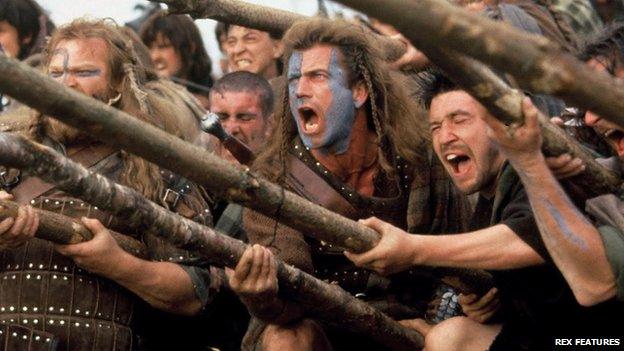
Is the 'Braveheart' image of Scotland obscuring the referendum debate overseas?
Kim Hjelmgaard is USA Today's London bureau chief. You can follow him on Twitter, external.

"On balance, most Americans will not be familiar with the details of this debate.
"There is probably a temptation to think that those that are will view it largely in terms that are assumed to be the go-to American preferences for freedom and political autonomy.
"No doubt there is some of that. When USA Today ran some stories on this topic last year, for example, many readers certainly reacted to the debate by framing it along those lines. This suggestion that an independent state is the natural state of any man, woman, or nation.
"It didn't take long for those feelings and attitudes - misplaced or not - to rise to the surface. And several Scots-Americans I spoke to distinctly related to the question of whether Scotland should break out on its own in that way.
"The challenge for international bystanders looking to make sense of this debate - and this applies to anyone, not just Americans - is to get to know some more detail about modern Scotland.
"Not just the Scotland that is rich in cultural history and that gets exported, but the Scotland that is looking to create jobs, pay mortgages, educate its young, treat the sick and care for its elderly."

3. Argentina
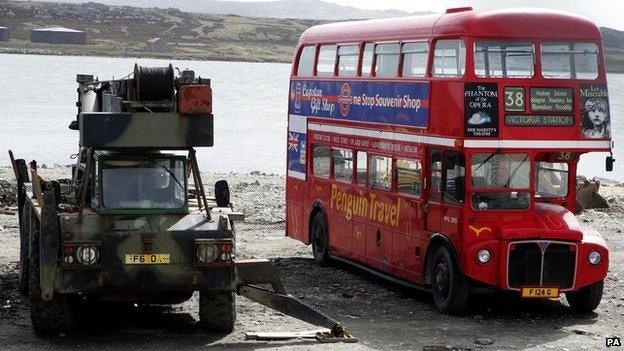
Some Argentinians have drawn parallels between Scotland and the Falkland Islands
Kristie Robinson is a British journalist based in Buenos Aires and the founder and editor of The Argentina Independent. You can follow her on Twitter, external.

"The issue of Scottish independence first hit the headlines in Argentina last March when a date for the referendum was decided, and reactions here have been mixed.
"While the Argentine government sees Scottish independence as an internal British affair, and history dictates it will unlikely comment officially until after the results are in, the general public - and commentators - have been quick to opine.
"Many believe if Scotland were to gain independence, it could help Argentina in their sovereignty claims on the Falkland Islands, seeing the country's departure from the union as a catalyst for the eventual breakup of what many consider to be Britain's 'empire' and their 'colonial hold' over the South Atlantic islands.
"Others are slower to draw the parallels between Scotland and the Falklands, preferring to look to Cataluña's attempts to separate from Spain as something similar to the Scottish cause.
"As a people, Argentines tend to be supportive of independence movements, having themselves separated from the Spanish crown just 200 years ago, fervently believing in a people's right to self-determination.
"It is felt that the very existence of Scotland's referendum is setting a positive precedent for other independence movements around the world."

4. Canada

Canada and Quebec have a long tradition of independence referendums
Celine Cooper is an opinion columnist for The Gazette in Montreal. You can follow her on Twitter, external.

"The independence referendum in Scotland has yet to really alight on the Canadian media. But as the Yes Scotland and the Better Together campaigns dig into the final push before the September 2014 vote, brace yourselves for an onslaught of made-in-Canada commentary.
"You see, we Canadians fancy ourselves experts in all matters 'referendum'. The predominantly French-speaking province of Quebec has held two votes on independence - one in 1980 and another in 1995. Neither resulted in Quebec becoming its own country, but both were highly emotional affairs causing massive political upheaval.
"It begs the question: will Canadians approach the Scotland referendum on its own terms, or will we continue to see it as a stand-in for our own unresolved constitutional situation?
"Keen observers will argue (correctly) that Quebec and Scotland's respective independence movements are more dissimilar than they are alike, shaped as they are by wildly different historical, geographical and social conditions.
"Since their election to a majority government in 2011, the SNP's key message has been that Scots will be economically better off as a separate state than as part of the United Kingdom.
"In Quebec, the economic argument is nominal. The overriding message for independence since the 1960s has been that statehood is necessary to preserve the French language, culture and identity.
"But perhaps the biggest difference of all is this: whereas British Prime Minister David Cameron and Scottish First Minister Alex Salmond have agreed that this will be a once-in-a-generation vote, here in Canada we are eternally looking down the barrel of a third referendum on Quebec independence.
"Maybe we're the ones who should be taking notes."

5. China
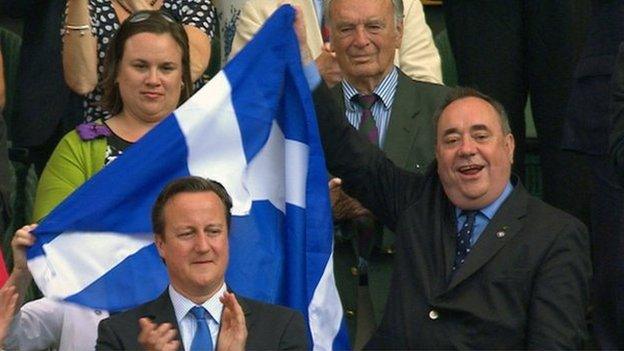
Alex Salmond's flag-waving at Wimbledon caused bemusement in China
James Chau is a broadcaster and journalist for CCTV News, and has guest presented on Horizons on BBC World News. You can follow him on Twitter, external.

"Mention the word "referendum", and I think first of Egypt and the resounding "Yes" in favour of its draft Constitution.
"The violence that triggered the Egyptian vote is of course very different from the lead-up to the Scottish referendum, which in turn explains in part why the news coverage in China is dominated by the former, and has been far less visible on the latter.
"Behind the desk where I present the nightly news in Beijing, I've read two, maybe three scripts on the Scottish referendum in the last half year. On social media, too, I tweeted to my 1.7 million followers on Weibo to gauge awareness on the Scottish vote: only two people responded.
"But that's not to say that people here are unaware of the major changes that could be afoot. After all, near neighbours from India to Indonesia have won independence since the end of the WWII, while new ones, like Pakistan and Bangladesh, have been created.
"Scotland's own process is far less dramatic, though Alex Salmond's energetic waving of the Saltire while David Cameron's head was fully in camera shot, did much to bring a bemused smile during Andy Murray's Wimbledon win last year.
"But if anything that in itself makes the subtle point: "Yes" or "No", this is a serious decision that the people of Scotland are making, which will take more than a flag or two before voters choose which colours will eventually fly over them."

6. Norway
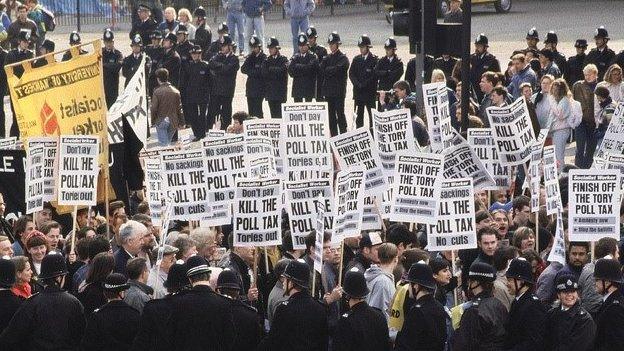
Will residual anger from Margaret Thatcher's poll tax affect Scotland's referendum?
Anne-Lise von der Fehr is the UK and Ireland correspondent for the national Norwegian newspaper VG.

"Keep Scotland tidy - throw your rubbish in England".
"I spotted this car sticker on my very first visit to Scotland in 1991. The impression of a people feeling like second range citizens in the UK has stuck with me ever since.
"I met with a group of students at the University of Glasgow in 2012 and talked to them about the referendum. I was amazed at their anger with the poll tax and frustration over Margaret Thatcher. The tax was implemented before they even were born.
"Seen through Norwegian eyes, Alex Salmond and his campaign have a huge challenge. Their wish for an independent Scotland seems to be based on a strong feeling of nationality, culture and feeling of difference from the English. The problem they face is that it's hard to see how the people of Scotland will benefit from a break away from the UK.
"I went to Mr Salmond's home town Strichen on the day he launched his White Paper, external. To my surprise I struggled to find people planning to vote 'Yes'. I realised that there is a huge difference between voting for him in the national election and to vote for a break away from the UK.
"I fear a 'no' in the referendum will make the Scots feel like a nation of cowards. But I hope not."

7. India
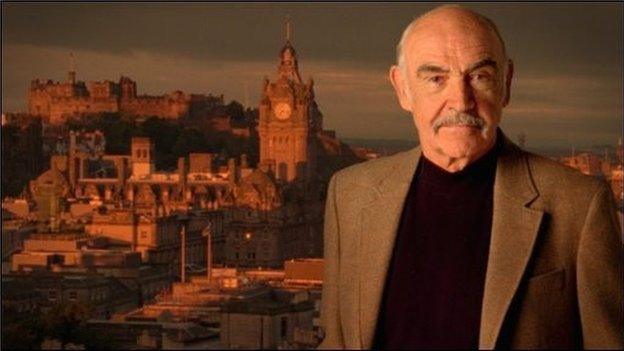
Sean Connery's support for independence is one of few referendum details Indians are aware of
Dilip D'Souza is based in Bombay and has written for publications including Hindustan Times, Newsweek and the New York Times. You can follow him on Twitter, external.

"Scotland independent! Fine thought, but let's be honest: not too many Indians really care.
"Oh yes, we know about that famous Scotsman Sean Connery, and his support for independence. We know someone unfurled Scotland's flag at Wimbledon after another famous Scotsman, Andy Murray, won his title. But more than that?
"Yet it's an idea that, just maybe, should get more traction here.
"You see, we too have a northern territory where many residents are, putting it mildly, restive about its status. Kashmir acceded to India in 1947, but a chunk has been held by Pakistan since 1948. And in the rest of the state, thousands upon thousands of Indian troops enforce an uneasy, always simmering calm of sorts.
"Can we learn from Scotland and the UK? As far as I can tell, the question of Scottish independence has always only been debated politically. No British military presence on the streets of Edinburgh and Glasgow, certainly. No hostile face-off with a neighbour. Can we correlate that to the reality that the idea of independence has, so far, never attracted the support of more than about a third of Scotland?
"Tackle wrangles politically - you win respect and, maybe, allegiance. Seems about right."

8. Spain
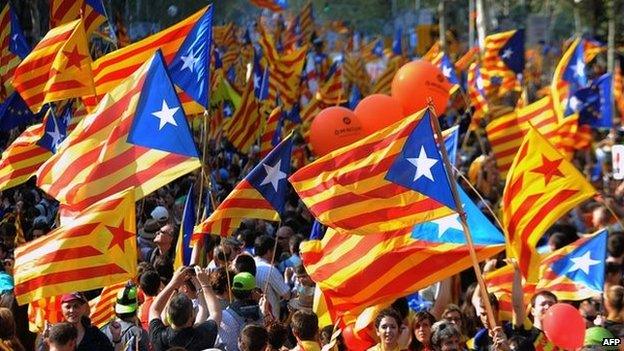
Spaniards and Catalans are keeping a keen eye on events in Scotland
Walter Oppenheimer is the UK correspondent of the El Pais newspaper. You can follow him on Twitter, external.

"The Scottish referendum is important in Spain because of the influence that it is having on the debate over the independence of Catalonia and, in the long term, of the Basque country. At the exclusion of many others (historical, economic, legal), there are two main differences between the cases of Catalonia and Scotland.
"The most noteworthy is the fact that London accepted the consultation because it is the will of the Scottish Parliament. In the judgement of Madrid, David Cameron was too quick and above all, went too far, in accepting the referendum.
"From the side of those who are pro-independence, the big difference is that the SNP won two consecutive elections with a manifesto in which they promised to call a referendum about Scottish independence if they had a sufficient majority.
"That has never happened in Catalonia: the coalition government, CiU, proposed in their 2012 manifesto to call a consultation so that Catalonia 'could have a state of its own within the frame of Europe'. This is a calculated ambiguity because it permits the creation of a Catalan state within a federal or confederal Spain.
"It is an ambiguity that will not be repeated if, this year, there is no referendum and the Catalans are called again to the ballot box."
Want to learn more about the Scottish independence debate? Go to the BBC news website's special Scotland's Future section.